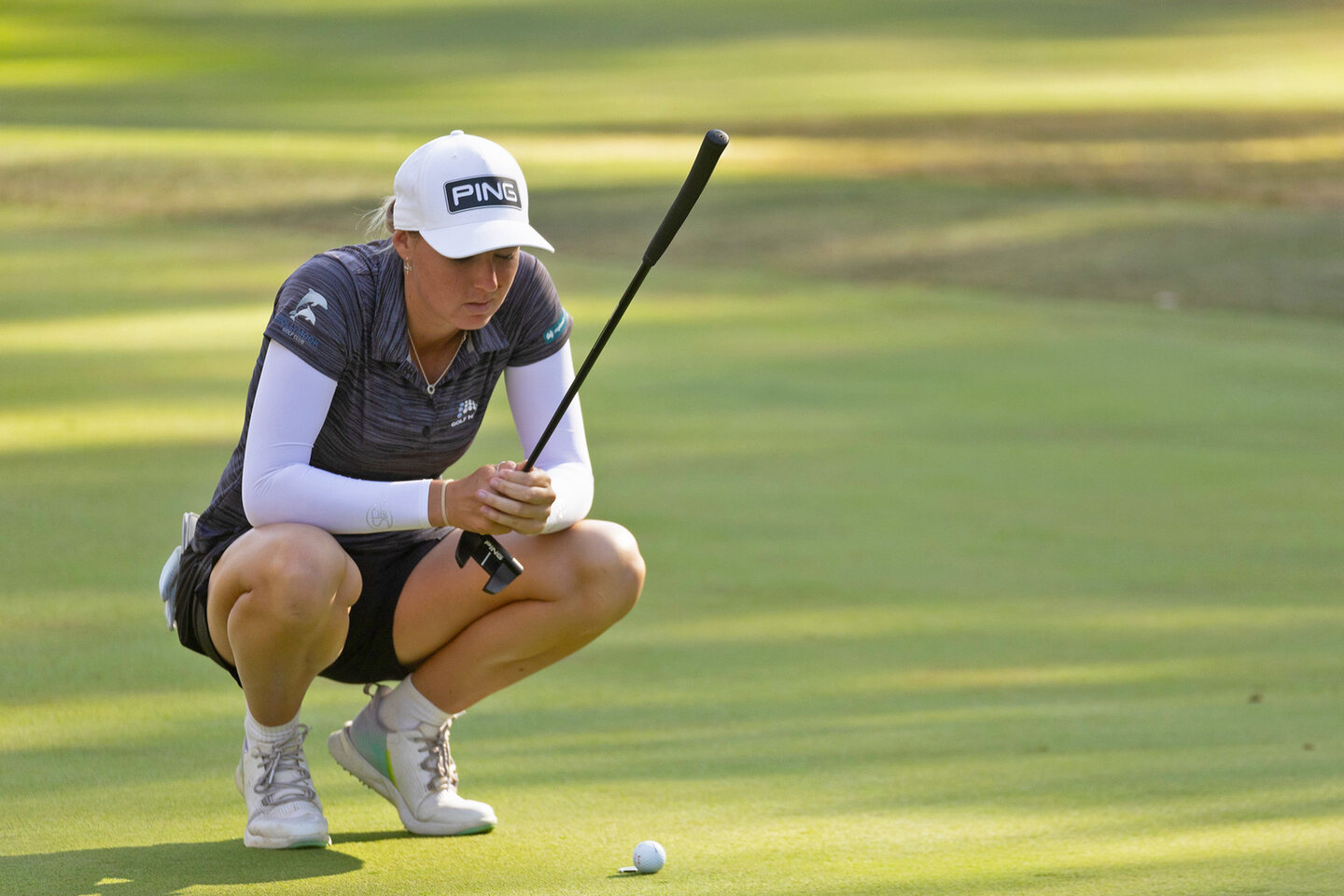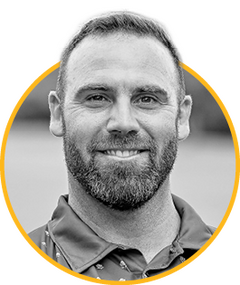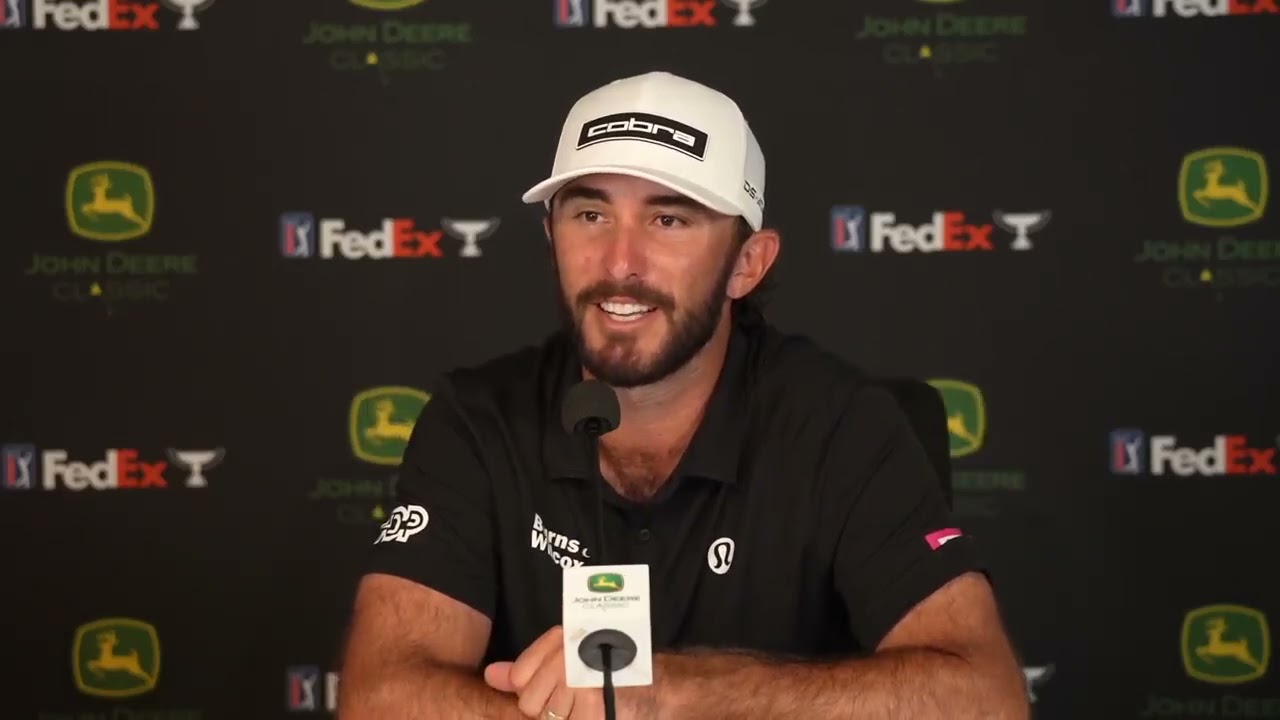
MIND & BODY
Mind your
LANGUAGE
Dr Kirsten van Heerden discusses the trouble with expectations, and how to play (and live) without the weight of perfection
By GAVIN GROVES

There’s a strange paradox many of us live with: we’re often kinder to our friends than we are to ourselves. A missed putt, a forgotten birthday, a less-than-stellar presentation at work – and suddenly, the voice in our head is berating us as if we’ve failed some moral test.
It’s the same for many golfers. You shoot the lights out on Thursday and Friday, only to unravel on Saturday, and by Sunday, you’re spiralling – not just on the scoreboard, but in self-worth too. Or you’re returning from injury and expect to pick up where you left off, only to find your swing won’t co-operate and your patience runs thin. ‘I should be better than this,' you mutter. But should you?
At the heart of these internal struggles is expectation. And psychology, especially the kind that looks at how we relate to ourselves, has a lot to say about it.
When we perform poorly or fall short of expectations, we don’t just critique the action – we attack the self
SELF-TALK, SELF-THREAT
Let’s start with self-talk – the internal commentary running constantly in the background of our lives. We like to think it’s rational, maybe even motivational. But often, it’s not. Studies in cognitive psychology show that our inner dialogue can easily become what psychologists call self-threat. When we perform poorly or fall short of expectations, we don’t just critique the action – we attack the self.
The classic study by Claude Steele in the 1980s on ‘self-affirmation theory’ showed that when people feel their self-worth is under threat, they tend to double down on defensiveness or avoid feedback altogether. This is why after a bad round, some golfers want to quit, or blame their clubs, or never return to that course again. The performance wasn’t just bad – it became a judgement on who they are.

DID YOU KNOW?
GolfRSA has partnered with The R&A for a year-long journey looking at the benefits of golf, with a highlighted theme each month.
Explore the benefits of golf and why you should choose this sport as your #HealthyHabit for life. Research has shown that golf improves many physical and mental aspects including muscular strength, power, endurance and confidence. Golfers also benefit from green space and social interaction.
Join The Golf Mag and GolfRSA on social media and share how golf has been good for your health.
Goals should stretch us, not strangle us. Expectations should motivate, not menace
THE MYTH OF THE CONSTANT CLIMB
Modern culture doesn’t help. We are, in many ways, worshippers of upward curves – growth, improvement, progress. We like comeback stories, but we prefer them fast. And so we expect that once the worst is behind us – be it an injury, a slump, a setback – the return will be linear.
But psychological research on learning, recovery and habit change suggests otherwise. Progress is rarely a straight line; it’s more like a scribble. In fact, psychologist James Prochaska’s stages of change model highlights that relapse, or regression, is a normal, even an expected part of growth.
Translated to golf? That horror third round after two great ones isn’t necessarily a collapse. It might just be part of the curve.
THE KINDNESS OF LOW EXPECTATIONS?
There’s an old story in Zen philosophy that goes something like this: A student asks the master, ‘What is the path to happiness?’ The master replies, 'Lower your expectations.’ The idea, of course, isn’t to stop trying or caring. It’s to stop attaching your entire identity to the outcome.
This is echoed in the work of Kristin Neff, a researcher known for her studies on self-compassion. Her research shows that people who treat themselves kindly – not indulgently, but with understanding – are not only more resilient, but actually perform better over time. They don’t get stuck in self-criticism, so they can adapt and improve.
When we scold ourselves after a bad round, we might think we’re being disciplined. In reality, we’re just adding unnecessary mental weight. Self-compassion, oddly enough, is not the enemy of high standards – it’s often what makes achieving them sustainable.
FINDING THE BALANCE
Max Homa reflects on his recent struggles and shares insight into how he’s leaning on friends and learning to adjust expectations.
watch NOW

THE JOY OF THE MIDDLE GROUND
So, where does this leave us? Somewhere in the middle, I think. Not in mediocrity, but in moderation. In psychology, this is known as the ‘Goldilocks Principle’ – the idea that we function best when things are just right. Not too hard, not too easy. Goals should stretch us, not strangle us. Expectations should motivate, not menace.
This applies to life as much as it does to sport. Whether you’re navigating a work transition, recovering from surgery, or trying to find your swing again, the challenge is not to eliminate expectations, but to hold them lightly. To care, but not catastrophise. To aim, but not demand.
REWRITING THE INTERNAL SCRIPT
One of the most practical findings in psychology is that language matters – especially the language we use with ourselves. Research by Ethan Kross on ‘distanced self-talk’ shows that referring to yourself in the third person during moments of stress (eg, ‘OK, Kirsten, breathe. You’ve done this before.’) helps reduce anxiety and improve focus. It’s not about pretending everything is fine – it’s about stepping back and offering yourself the same perspective and calm you’d give to a friend.
So maybe next time you feel like you’re falling short – whether it’s on the back nine or in your inbox – you can pause, take a breath, and shift the script. Instead of asking, ‘Why am I so bad at this?’ try, ‘What would I tell a friend right now?’ That small change might not save your scorecard, but it could save your sanity.
And in the long game – of golf, of life – that may be the more important win.
About the author
Gavin Groves graduated in biokinetics from the University of Pretoria in 2007 and started working as a golf fitness professional at the World of Golf. A year later, he started his journey with the Titleist Performance Institute. He is also an AA-member of the PGA of South Africa. He joined the University of Pretoria's High Performance golf programme in 2013. In 2018, he moved to the DP World Tour, while he also counts numerous past and present Sunshine Tour professionals as clients. He has been the full-time fitness consultant of the GolfRSA National Squad since 2017 and worked with some of the best SA amateur golfers.
Gavin Groves graduated in biokinetics from the University of Pretoria in 2007 and started working as a golf fitness professional at the World of Golf. A year later, he started his journey with the Titleist Performance Institute. He is also an AA-member of the PGA of South Africa. He joined the University of Pretoria's High Performance golf
Gavin Groves graduated in biokinetics from the University of Pretoria in 2007 and started working as a golf fitness professional at the World of Golf.
A year later, he started his journey with the Titleist Performance Institute. He is also an AA-member of the PGA of South Africa. He joined the University of Pretoria's High Performance golf
programme in 2013. In 2018, he moved to the DP World Tour, while he also counts numerous past and present Sunshine Tour professionals as clients. He has been the full-time fitness consultant of the GolfRSA National Squad since 2017 and worked with some of the best SA amateur golfers.


About the author
Dr Kirsten van Heerden represented South Africa at swimming and holds a PhD in sport psychology. She has worked and travelled extensively within high performance sport for more than 15 years. She has authored a book, Waking From the Dream, on the challenges athletes face when they retire from elite sport. In her podcast ‘Behind the Dream’ she talks with some of the world’s best athletes about the ups and downs of being a professional athlete. She is also the founder and chairperson of Girls Only Project – a non-profit company focusing on women in sport issues. She is in private practice at Newton Sports Agency.
About the author
Dr Kirsten van Heerden represented South Africa at swimming and holds a PhD in sport psychology. She has worked and travelled extensively within high performance sport for more than 15 years.She has authored a book, Waking From the Dream, on the challenges athletes face when they retire from elite sport. In her podcast ‘Behind the Dream’ she talks with some of the world’s best athletes about the ups and downs of being a professional athlete. She is also the founder and chairperson of Girls Only Project – a non-profit company focusing on women in sport issues. She is in private practice at Newton Sports Agency.
Dr Kirsten van Heerden represented South Africa at swimming and holds a PhD in sport psychology. She has worked and travelled extensively within high performance
sport for more than 15 years.She has authored a book, Waking From the Dream, on the challenges athletes face when they retire from elite sport. In her podcast ‘Behind the Dream’ she talks with some of the world’s best athletes about the ups and downs of being a professional athlete. She is also the founder and chairperson of Girls Only Project – a non-profit company focusing on women in sport issues. She is in private practice at Newton Sports Agency.






